On January 21…
“Every true history must force us to remember that the past was once as real as the present and as uncertain as the future.”
~George Macaulay Trevelyan
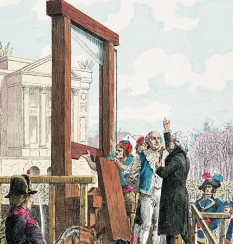
1793 – One day after being convicted of conspiracy with foreign powers and sentenced to death by the French National Convention, King Louis XVI was executed by guillotine in the Place de la Revolution in Paris.
His widow, Marie Antoinette, would suffer the same fate ten months later.
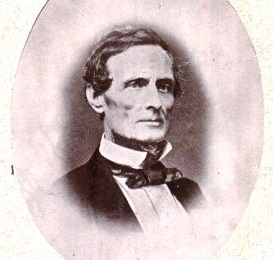
1861 – Five Southerners resigned from the U.S. Senate, including Jefferson Davis of Mississippi, the future president of the Confederacy.
Standing before his colleagues in the Senate, Davis said, “I rise, Mr. President, for the purpose of announcing to the Senate that the state of Mississippi has declared her separation from the United States.”
He explained that his state acted because “we are about to be deprived in the Union of the rights which our fathers bequeathed to us.”
Davis implored his Senate colleagues to work for a continuation of peaceful relations between the United States and the departing states. Otherwise, he predicted, interference with his state’s decision would “bring disaster on every portion of the country.”

1924 – Vladimir Lenin, the architect of the Bolshevik Revolution and the first leader of the Soviet Union, died of a brain hemorrhage at the age of 54.

1950 – In the conclusion to one of the most spectacular trials in U.S. history, former State Department official Alger Hiss was convicted of having perjured himself in regards to testimony about his alleged involvement in a Soviet spy ring before and during World War II.
Hiss served nearly four years in jail, but steadfastly protested his innocence during and after his incarceration.

1950 – George Orwell died of tuberculosis at the age of 46.
He wrote The Road To Wigan Pier, Animal Farm and Nineteen Eighty-Four.
He was buried in All Saints’ Churchyard, Sutton Courtenay, Oxfordshire, UK.
His gravestone bears the simple epitaph: Here lies Eric Arthur Blair, born 25 June 1903, died 21 January 1950.
No mention is made on the gravestone of his more famous pen name.



1953 – Dizzy Dean and Al Simmons were elected to the Baseball Hall of Fame by the Baseball Writers’ Association of America.
Incredibly, Joe DiMaggio failed to be elected on his first try. 264 ballots were cast and DiMaggio was named on just 117 of them.

1954 – The first atomic submarine, the USS Nautilus, was launched at Groton, Conn.
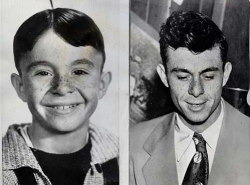
1959 – Carl Switzer (played Alfalfa in the Our Gang series in the 1930s) was shot to death in a dispute over a $50 debt. Switzer was 31.
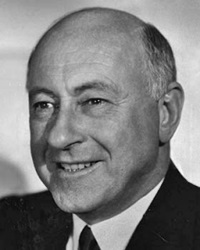
1959 – Film director Cecil B. DeMille died of heart failure at the age of 77.
He directed The Ten Commandments, Samson and Delilah, The Greatest Show On Earth, and the original version of Cleopatra.
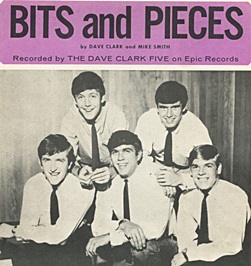
1964 – The Dave Clark Five recorded Bits And Pieces in England.
Although Bits And Pieces was credited to Dave Clark and Mike Smith, it was Ron Ryan who did the honors. His brother, Mick, was guitarist for the band before Lenny Davidson took over. He let Mike Smith take ‘Pieces’ (originally meant to be a country song) but after being promised writing royalties and on-label credits by Clark, Ryan received nothing … no credit and no royalties.
“I got treated badly, but (the band members) were ripped off regally. They were playing tours that were netting huge amounts of money, appearing in films, and doing highly paid TV and radio work and all they were getting was a flat weekly wage. Compared to the average British working man at the time, it was a good wage, but it was only a fraction of what the band were turning over. The lion’s share went into Mr. Clark’s coffers. On top of that every song band members wrote had to have ‘Dave Clark’ on it as a “co-writer” or the song would not be recorded.”
~Ron Ryan

1967 – Actress Ann Sheridan died of esophageal and liver cancer at the age of 51.
She starred in Angels With Dirty Faces, The Man Who Came To Dinner and Kings Row.
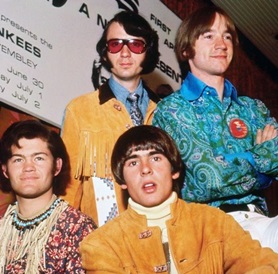
1967 – The Monkees recorded A Little Bit Me, A Little Bit You.
Kinda, sorta.
Don Kirshner was still supervising Monkees’ recording sessions and persuaded Davy Jones to fly to New York and record a solo session with producer Jeff Barry, using session musicians instead of the band.
Kirshner chose the song for the next Monkees single. He also authorized pressing and distribution of the single; something he technically was not supposed to do without approval from Colgems, the band’s label.
When copies of the single appeared in Canada in March 1967, the song began to get airplay in both Canada and the U.S. Kirshner was fired on the grounds that he had issued an unauthorized record.

1968 – The Battle of Khe Sanh – one of the most publicized and controversial battles of the Vietnam War – began at the Khe Sanh Combat Base in the northwestern Quảng Trị Province, Republic of Vietnam (South Vietnam) when the North Vietnamese Army launched a series of coordinated attacks against American positions.
Once the base came under siege, a series of actions was fought over a period of five months. During this time, KSCB and the hilltop outposts around it were subjected to constant North Vietnamese artillery, mortar, and rocket attacks, and several infantry assaults.
To support the Marine base, a massive aerial bombardment campaign (Operation Niagara) was launched by the U.S. Air Force. Over 100,000 tons of bombs were dropped by U.S. aircraft and over 158,000 artillery rounds were fired in defense of the base.
In the end, the U.S. claimed victory during the seventy-seven days of siege. But that perception was shattered in July 1968 with the abandonment of the base, and Khe Sanh became etched in the minds of many Americans as a symbol of the pointless sacrifice and muddled tactics that permeated a doomed U.S. war effort in Vietnam.
History’s verdict of Khe Sanh as a U.S. defeat is more an indictment of General Westmoreland and his false claims that Khe Sanh was indispensable to the U.S. war effort, rather than a true accounting of the epic siege.

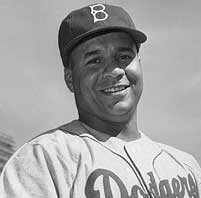
1969 – Stan Musial and Roy Campanella were elected to the Baseball Hall of Fame by the Baseball Writers’ Association of America.

1969 – Elvis Presley recorded In The Ghetto and Don’t Cry Daddy at American Sound Studio in Memphis.
Both songs were written by Mac Davis and both became Top 10 hits for Presley.

1971 – No one was elected to the Hall of Fame by the Baseball Hall of Fame by the Baseball Writers’ Association of America.
18-time All Star Yogi Berra received the highest percentage of votes (67.2%) but fell 28 votes short of the required 75%.

1977 – One day after his inauguration, President Jimmy Carter kept a campaign promise and pardoned almost all Vietnam War draft evaders. Carter’s decision generated a good deal of controversy.
Carter’s pardon stated that only civilians who were convicted of violating the Military Selective Service Act by draft-evasion acts or omissions committed between August 4, 1964 and March 28, 1973 were eligible.
The pardon was unconditional and wiped criminal records clean, but it only applied to civilians, not the estimated 500,000 to 1 million active-duty personnel who went AWOL or deserted during the war.
Heavily criticized by veterans’ groups and others for allowing unpatriotic lawbreakers to get off scot-free, the pardon and companion relief plan also came under fire from amnesty groups for not addressing deserters; soldiers who were dishonorably discharged or civilian anti-war demonstrators who had been prosecuted for their resistance.

1979 – The Pittsburgh Steelers defeated the Dallas Cowboys, 35-31 at Super Bowl XIII.
Steelers’ quarterback Terry Bradshaw passed for 318 yards and 4 TDs to win the Most Valuable Player award.

1983 – Lamar Williams died of lung cancer at the age of 34.
Williams replaced Berry Oakley, the original bass guitarist with the Allman Brothers Band in 1972 following Oakley’s death, and played on Brothers and Sisters, one of the band’s most successful albums.
Williams was diagnosed with lung cancer in 1981. His doctors believed that the disease was derived from exposure to Agent Orange during his Vietnam service. He died less than two years later.
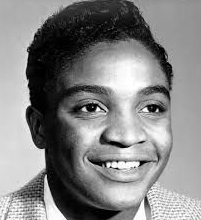
1984 – Jackie Wilson died eight years after a heart attack and subsequent fall left him in a coma with brain damage. He was 49.
His hit songs included (Your Love Keeps Lifting Me) Higher and Higher, Lonely Teardrops, Reet Petite, Baby Workout, and I’ll Be Satisfied.
He was inducted into the Rock and Roll Hall of Fame in 1987.
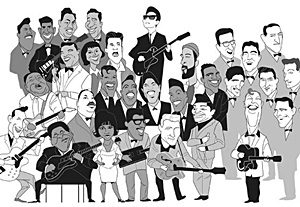
1987 – The Coasters, Eddie Cochran, Bo Diddley, Aretha Franklin, Marvin Gaye, Bill Haley, B. B. King, Clyde McPhatter, Ricky Nelson, Roy Orbison, Carl Perkins, Smokey Robinson, Big Joe Turner, Muddy Waters and (as noted above) Jackie Wilson were inducted into the Rock & Roll Hall of Fame.

1994 – A jury in Manassas, Va., acquitted Lorena Bobbitt by reason of temporary insanity for maliciously “wounding” her husband, John, whom she had accused of sexually assaulting her.
Let’s just “cut” to the chase. “Wounding” seems like such an understatement.

1996 – The 555-ton Gurita, typically used to ferry passengers between Indonesia’s islands, was sunk in an unexpected storm off the coast of Sumatra, Indonesia.
Although exact numbers were impossible to determine, approximately 400 people were on board when the ship left Jakarta, well in excess of the official capacity of 220.
When the Gurita encountered a strong storm just six miles from Sabang, the overload exacerbated the disaster. As the ship began to sway and lurch violently, people began to panic and fight over life jackets as there were not enough for everyone on board.
The Gurita sank quickly and the surrounding waters quickly filled with bodies. Sharks attacked the bodies of the dead and those still living.
Of the estimated 400 on board, only 47 survived.
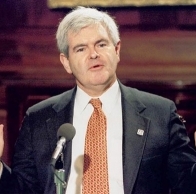
1997 – The U.S. House of Representatives voted 395–28 to reprimand Speaker Newt Gingrich for ethics violations, making him the first Speaker of the House to be so disciplined.
Eighty-four ethics charges were filed by Democrats against Gingrich during his term as Speaker.
All were eventually dropped except for one: claiming tax-exempt status for a college course run for political purposes. In addition to the reprimand, Gingrich was ordered to reimburse the House for some of the costs of the investigation in the amount of $300,000.
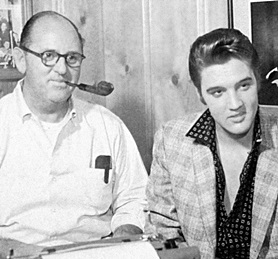
1997 – “Colonel” Tom Parker died from complications of a stroke at the age of 87.
Born Andreas Cornelis van Kuijk, he arrived in America by jumping ship, and never held a U.S. passport. He enlisted in the United States Army, taking the name “Tom Parker” from the same name of the officer who interviewed him, to disguise the fact he was an illegal immigrant.
A carnival worker by background, Parker moved into music promotion, earning the courtesy rank of “Colonel” from a grateful singer/songwriter Jimmie Davis (You Are My Sunshine), who had become the Governor of Louisiana.
Parker discovered the then-unknown Elvis Presley in 1955, and skillfully maneuvered himself into position as his sole representative with control over much of his private life. That meant financial control, too.
The 50% he took from Presley’s earnings was out of line with industry norms. A commission of 10% to 15% of a star’s earnings was standard for personal managers.
And then there was this: Parker’s 1973 agreement with RCA allowed the label to buy out the rights to Presley’s 700 songs. In the deal, Parker received $6.2 million over seven years. Presley received $4.6 million.
Presley fans have speculated that the reason Presley failed to undertake the highly lucrative prospect of touring other countries and continents, may have been that Parker was worried that he would not have been able to acquire a U.S. passport and might even have been deported.
For example, in 1975, the government of Saudi Arabia offered Parker $5 million for Presley to perform there. Parker turned the offer down, and Presley was overjoyed when they replied with another offer of $10 million. Despite Presley’s eagerness to do the shows, Parker again turned them down.
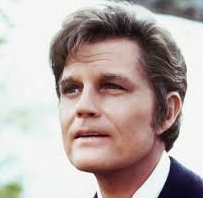
1998 – Actor Jack Lord (Dr. No, Stoney Burke and Hawaii Five-0) died of congestive heart failure after a two-year battle with Alzheimer’s disease. He was 77.

1999 – In one of the largest drug busts in American history, the United States Coast Guard intercepted a ship with over 4,300 kilograms (9,500 pounds) of cocaine on board.
The ship, a 580-foot Greek-owned freighter called Cannes, was transporting 26,000 metric tons of iron ore from Brazil to Houston, Texas.
According to the Drug Enforcement Administration, the cocaine was worth $186 million.
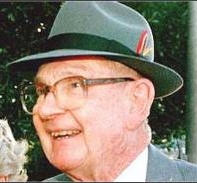
2001 – Byron De La Beckwith, convicted of killing civil rights leader Medgar Evers in 1963 (but not convicted until 1994), died at the age of 80 in Mississippi State Prison.
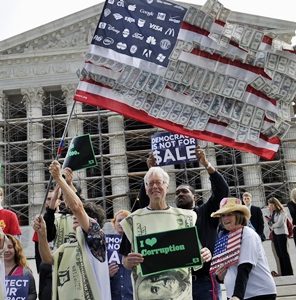
2010 – A 5-4 decision by the U.S. Supreme Court, in Citizens United v. Federal Election Commission, vastly increased the power of big business and labor unions to influence government decisions by freeing them to spend their millions directly to sway elections for president and Congress.
Justice Anthony Kennedy’s majority opinion found that the prohibition of all independent expenditures by corporations and unions violated the First Amendment’s protection of free speech.
The majority wrote, “If the First Amendment has any force, it prohibits Congress from fining or jailing citizens, or associations of citizens, for simply engaging in political speech.”
A dissenting opinion by Justice John Stevens emphasized his unhappiness with the majority. He argued that the Court’s ruling “threatens to undermine the integrity of elected institutions across the Nation. The path it has taken to reach its outcome will, I fear, do damage to this institution.”
He added: “A democracy cannot function effectively when its constituent members believe laws are being bought and sold.”

2017 – Over 400 cities across America and 160+ countries worldwide participated in a large-scale women’s march on Donald Trump’s first full day as President of the United States.
Compiled by Ray Lemire ©2020 RayLemire.com / Streamingoldies.com. All Rights Reserved.